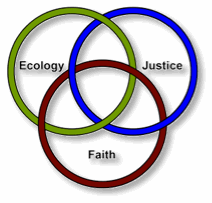ABOUT “ECOJUSTICE NOW”
This website, edited by the director of the Program on Ecology, Justice and Faith, explores the overarching moral assignment of our time, which is: to act in environmentally fitting and socially just ways that seek the well-being of humans with otherkind in one Earth community, right now and over time.
Engagement for eco-justice -- ecological integrity and social equity together -- is the focus of an ecumenical, cross-cultural movement, already 40 years old, that fosters constructive alternatives to more environmental degradation and socio-economic injustice. With the future of Earth community so threatened by the intense nature-destruction and gross social inequity of much human activity, every sector of society must now challenge maldevelopment (unsustainable human production, consumption, and reproduction) and work to achieve sustainable sufficiency for all.
To facilitate reflective thinking and doing, we post selected articles and refer to related resources under the following headings:
- Eco-Justice Ethics
- Earth Citizenship
- Practical Steps
- Religious Leadership
Our special contribution to environmental or sustainability ethics is to comprehend the dynamics of engagement focusing on ecology + justice and to apply this ethical approach to urgent global/local issues. By pointing to other web sites that detail PRACTICAL STEPS to take toward just and sustainable community, we also encourage particular ways to care for creation and to achieve earth justice. Another section of this website considers what to expect of RELIGIOUS LEADERSHIP and it outlines basic contours of theological education for eco-justice ministry that cares for place as well as people.
We want, with help from other voices, to bring eco-justice vision and values to bear on five urgent, interrelated responsibilities of 21st century EARTH CITIZENSHIP, namely to:
- Join the struggle for environmental justice that resists conditions of social inequality and severe land / water / air pollution;
- Meet basic human obligations to ecosystems and other kind through prevention, protection, preservation, and restoration;
- Act to mitigate global warming and to achieve climate justice in ways consistent with our ethical norms;
- Foster local / global food security through eco-just production, consumption and trade;
- Build sustainable communities through “green” policies and practices that counteract destructive economic globalization.
